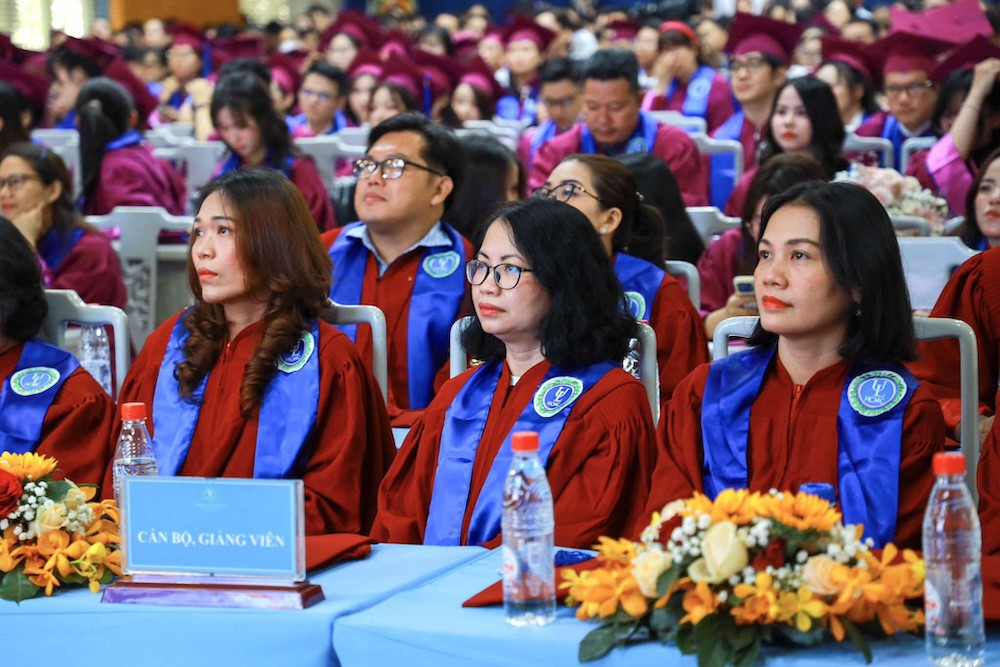
Professors and PhD holders in Vietnam can now earn billions of VND per year at universities, ensuring financial stability and allowing them to focus on their academic careers without resorting to selling research papers for extra income.
Selling research papers to make ends meet?
Not long ago, the academic community was stirred by a case involving an associate professor in Central Vietnam who was found to have violated research integrity.
According to MathSciNet, the American Mathematical Society’s online bibliographic database, the associate professor had published a total of 42 research papers. However, despite being a full-time lecturer at one university, 13 of his papers were affiliated with Ton Duc Thang University and four with Thu Dau Mot University.
In an interview, he explained that his university did not prohibit full-time faculty members from signing research contracts with other institutions, as long as they fulfilled their primary research obligations.
Since writing a research paper requires significant effort and goes through multiple stages, he sought financial compensation for his work. For him, using his intellectual abilities to earn money was the only viable option.
Following the controversy over publishing international papers under different university affiliations, the associate professor submitted a request to withdraw from the Mathematics Council of Nafosted (Vietnam’s National Foundation for Science and Technology Development), where he was a member at the time. Nafosted accepted his request after deliberating on the issue.
Professors and PhDs earning billions per year - where does the income come from?
After VietNamNet published an article about professors and PhDs earning nearly 100 million VND ($4,200) per month at universities, many readers agreed that such compensation is well-deserved, allowing academics to focus on their work without financial concerns.
So how do professors and PhDs earn such high incomes? According to Associate Professor Do Van Dung, former rector of Ho Chi Minh City University of Technology and Education, their income comes from multiple sources.
First, they receive salaries as high-ranking lecturers. Professors, associate professors, and PhD holders are classified as senior lecturers with a starting salary coefficient of 6.2, meaning their base salary under state regulations is already substantial.
In addition to their base salary, universities pay them additional wages based on their job positions, which can amount to tens of millions of dong per month. Combining these two sources, they typically earn between 35–60 million VND ($1,470–$2,520) per month.
The second income source is from teaching. Beyond their required teaching hours, most professors and PhDs take on extra lectures, earning additional income. Universities currently pay 150,000–1,000,000 VND ($6–$42) per lecture hour, meaning a dedicated academic can earn an amount equal to or even greater than their salary. Many also teach as visiting lecturers at other institutions.
The third and most lucrative source is scientific research. Most universities now incentivize international publications, offering rewards ranging from 30 million to 200 million VND ($1,260–$8,400) per paper, depending on its ranking in SCIE, SSCI, or other prestigious journal indices (Q1, Q2, Q3, Q4). This means a professor or PhD holder publishing just 5–6 papers per year can earn over a billion VND annually.
“In addition, prestigious universities often have research contracts with companies and external organizations, further boosting academics’ incomes,” Dung noted.
However, he pointed out that not all professors and PhDs earn equally. While talented academics can achieve high earnings, those who rely on seniority rather than active research and teaching may earn significantly less - around a few tens of millions of dong per month.
Universities competing to attract top academics
Dr. Nguyen Trung Nhan, head of academic affairs at Ho Chi Minh City University of Industry, emphasized that incomes vary depending on a professor’s expertise, position, and the university’s financial structure.
To attract top talent, universities offer substantial incentives. For example, his institution provides newly recruited professors with a one-time payment of 350–500 million VND ($14,700–$21,000), while associate professors receive 250–350 million VND ($10,500–$14,700).
Additionally, they receive monthly academic allowances - 12 million VND ($500) for professors and 10 million VND ($420) for associate professors - on top of their state-regulated salaries and institutional job-based salaries. Researchers with publications also receive financial rewards based on university policies.
Nhan believes that cases of academics selling research papers stem from the financial constraints of their institutions. Public universities that have not yet achieved financial autonomy often offer lower salaries and incentives, making it difficult for faculty members to sustain themselves solely on their primary salaries.
Ultimately, a professor’s or PhD holder’s income depends on their institution - whether it is a financially autonomous public university, a private university, or a state-funded university with limited financial flexibility.
Le Huyen